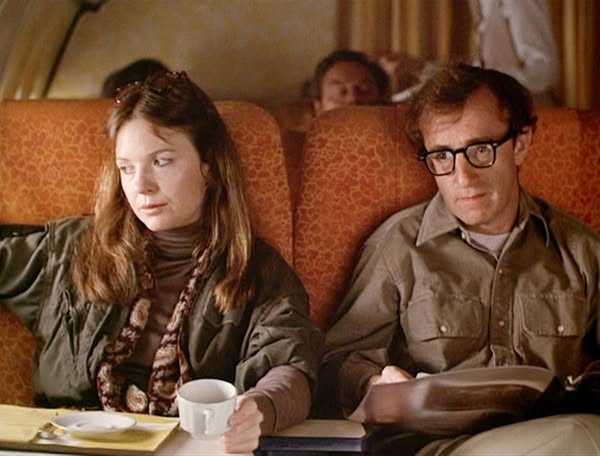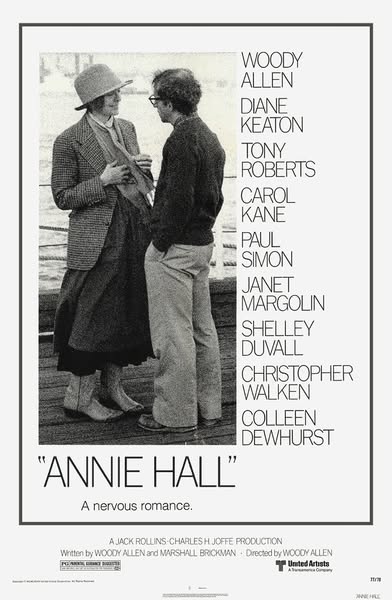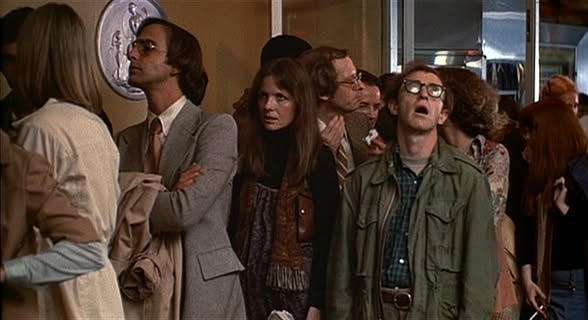Annie Hall (1977)

Annie Hall is a seminal film that has left an indelible mark on the landscape of romantic comedies and cinema as a whole. Released in 1977, this film is often hailed as one of Woody Allen’s masterpieces, blending humor, poignant insights, and a unique narrative style that redefined the genre. Its innovative approach to storytelling and character development has made it a beloved classic, resonating with audiences for decades.
The film follows the romantic relationship between Alvy Singer, played by Woody Allen himself, and Annie Hall, portrayed by Diane Keaton. Set against the vibrant backdrop of New York City, Annie Hall navigates the complexities of love, relationships, and personal identity. Alvy, a neurotic and introspective comedian, grapples with his insecurities and existential musings throughout the film. His relationship with Annie evolves from a whimsical romance to a poignant exploration of the challenges that accompany intimacy and commitment.

One of the defining features of Annie Hall is its distinctive narrative structure. The film employs a non-linear storytelling technique, often breaking the fourth wall and incorporating direct addresses to the audience. This innovative approach allows viewers to engage more intimately with Alvy’s inner thoughts and feelings, providing a deeper understanding of his character. The film seamlessly blends humor with moments of profound reflection, inviting audiences to question the nature of love and the intricacies of human connections.
The film is also notable for its exploration of the modern relationship dynamic. Alvy and Annie’s romance is characterized by both joy and heartache, encapsulating the ebb and flow of love. Their interactions are marked by witty banter and genuine vulnerability, highlighting the complexities of communication and understanding in relationships. The film’s humor often stems from Alvy’s self-deprecating observations and Annie’s quirky personality, creating a charming and relatable dynamic that resonates with viewers.

Annie Hall is not merely a romantic comedy; it is a rich exploration of identity and self-discovery. Alvy’s introspective journey prompts viewers to reflect on their own experiences with love and relationships. The film delves into themes of nostalgia, personal growth, and the impact of past experiences on present relationships. As Alvy reminisces about his time with Annie, the film captures the bittersweet nature of love—a reminder that even the most beautiful connections can be fraught with challenges.
Woody Allen’s direction is both distinctive and masterful, capturing the essence of urban life while infusing the narrative with a sense of humor and introspection. The film’s cinematography and editing further enhance its unique style, with quick cuts and inventive visuals that mirror Alvy’s scattered thoughts. The use of music, particularly the memorable score, adds emotional depth, complementing the film’s themes and enhancing its overall charm.

Diane Keaton’s portrayal of Annie Hall is iconic, earning her an Academy Award for Best Actress. Her performance embodies the spirit of the 1970s, with Annie’s unique fashion sense and free-spirited personality becoming cultural touchstones. The chemistry between Keaton and Allen is palpable, making their on-screen relationship both relatable and compelling.
In conclusion, Annie Hall stands as a landmark film in the romantic comedy genre, offering a sophisticated blend of humor, poignancy, and innovative storytelling. Its exploration of love, identity, and the complexities of human relationships continues to resonate with audiences today. Woody Allen’s masterful direction, combined with standout performances, particularly from Diane Keaton, ensures that Annie Hall remains a timeless classic. The film invites viewers to reflect on their own experiences with love, making it a profound and enduring contribution to cinema.











